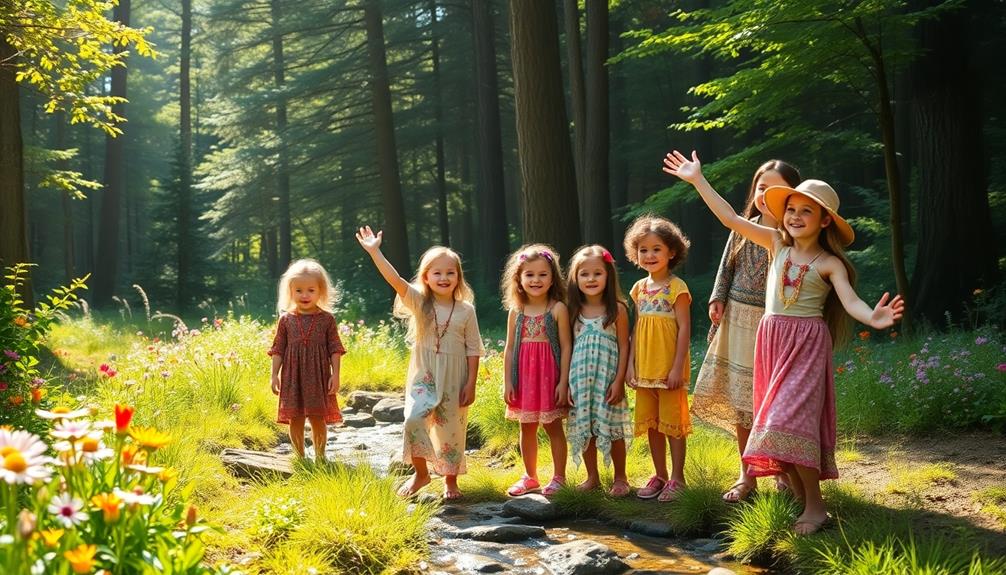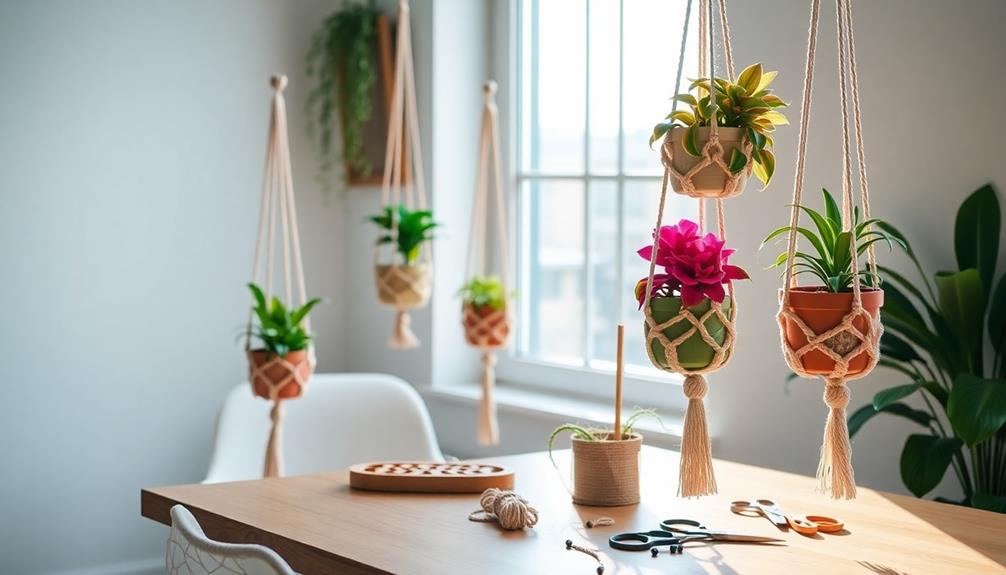Boho parenting embraces your child’s unique qualities and nurtures their emotional intelligence. You empower them to delve into their interests without fear of judgment, establishing a supportive atmosphere for self-expression. By encouraging their creativity through free play and artistic endeavors, you assist in improving their problem-solving abilities and resilience. Allowing them to tackle challenges on their own cultivates confidence and accountability. Connecting with other like-minded families fosters a sense of community and combats feelings of isolation. Embrace these principles to raise children who are free-spirited and flourishing, and you’ll find many more beneficial strategies along your journey.
Key Takeaways
- Encourage individuality by providing a safe space for self-expression and exploration of passions without fear of judgment.
- Foster emotional awareness by teaching emotional vocabulary and practicing regular emotional check-ins to enhance communication and understanding.
- Promote creativity through open-ended play and artistic activities, allowing children to explore their imagination and develop problem-solving skills.
- Support resilience and independence by offering opportunities for children to navigate challenges and make choices, reinforcing their sense of responsibility.
- Build a supportive community by connecting with like-minded families, engaging in open dialogues, and participating in community service to nurture empathy.
Embracing Individuality and Expression
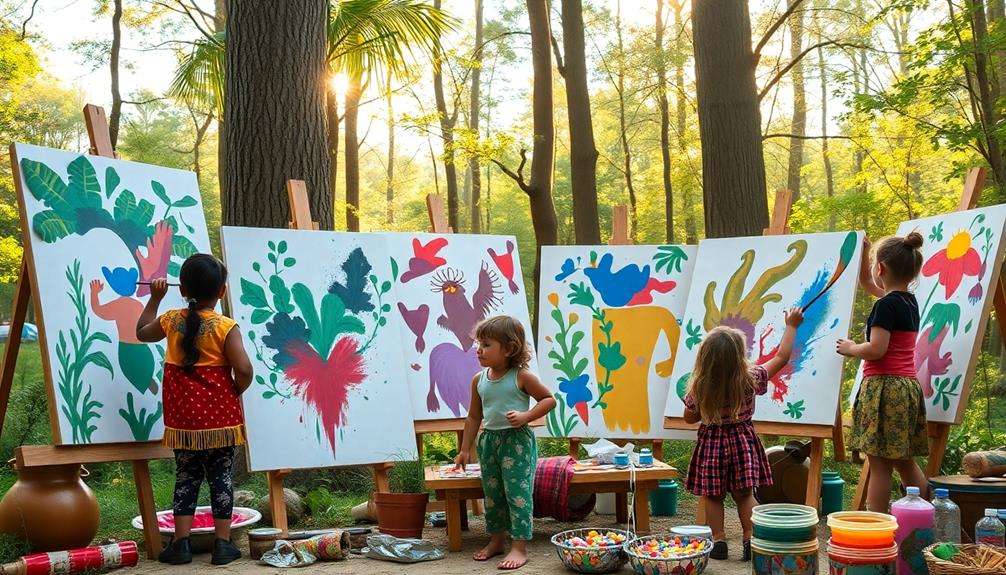
Embracing individuality in your child is vital for their development, as it helps them build unique personality traits and fosters self-acceptance. When you encourage your spirited children to express themselves, you allow them to explore their passions and interests without fear of judgment. This creates an environment where they feel safe to share their thoughts and emotions, leading to stronger self-awareness and resilience against societal pressures.
It's important to remember that emotional and psychological growth occurs in stages, and nurturing their self-expression can positively influence these key domains of development in psychology, including their emotional intelligence.
Open communication and active listening play an essential role in nurturing your child's self-expression. Make it a habit to engage in conversations about their feelings and experiences, showing them that their opinions matter. By valuing their unique traits, you help them develop confidence and authenticity.
Encouraging creative self-expression through art, music, and play not only enriches their emotional intelligence but also provides healthy outlets for their feelings. Embracing individuality allows spirited children to channel their heightened sensitivity into persistence and passion, enabling them to thrive.
As a parent, cultivating a nurturing atmosphere where your child's individuality is celebrated can markedly impact their growth into confident, self-accepting individuals.
Nurturing Emotional Awareness
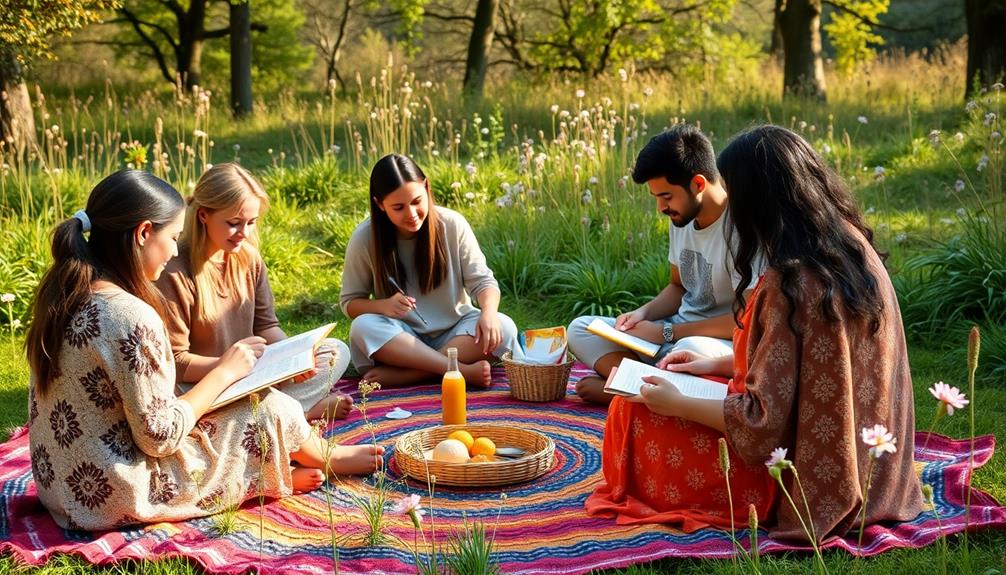
Nurturing emotional awareness in your child is essential for their overall well-being. Start by teaching them emotional vocabulary; this helps them articulate their feelings, paving the way for better emotional regulation. When children can name their emotions, they're more equipped to manage them effectively.
Recognizing signs of emotional stagnation can be vital for initiating growth and development, as identifying potential partners in relationships reflects the importance of emotional intelligence.
Engaging in open communication and active listening creates a safe space for your child to express themselves. This fosters trust and strengthens the emotional connection between you both.
Utilize techniques like the CALM method—Connect, Affect, Listen, Mirror—to enhance your interactions. These steps help you understand their feelings while encouraging them to explore their emotional landscape.
Encouraging your child to recognize and manage their emotions builds resilience, allowing them to cope with social rejections and other challenging situations more adeptly.
Establishing regular emotional check-ins can also be beneficial. It allows you to monitor their emotional well-being and provides opportunities for meaningful discussions about their feelings.
Encouraging Creativity and Exploration

From an early age, fostering creativity and exploration in your child can lead to significant growth in their cognitive and emotional development. By encouraging creativity through artistic activities like painting or music, you allow your child to express their emotions and individuality. This not only enhances their emotional intelligence but also builds confidence in their ability to communicate their feelings.
Engaging in these creative processes can also help your child connect with the magic of the Vortex, promoting alignment with their inner peace and desires.
Moreover, providing opportunities for exploration in nature helps boost their creativity while strengthening their connection to the environment. When children engage in open-ended play, they develop imaginative thinking and flexibility, essential skills for problem-solving.
Allowing them to make choices in their creative endeavors—like selecting materials or themes—fosters a sense of autonomy that further enhances their confidence.
Incorporating these elements into daily routines doesn't just support cognitive development; it nurtures your child's holistic well-being. By embracing their free-spirited nature and encouraging creative exploration, you're equipping them with the skills to navigate life's challenges with resilience and adaptability.
The journey of creativity is as important as the destination, and every moment spent exploring is a step toward fostering a confident, imaginative child.
Fostering Resilience and Independence
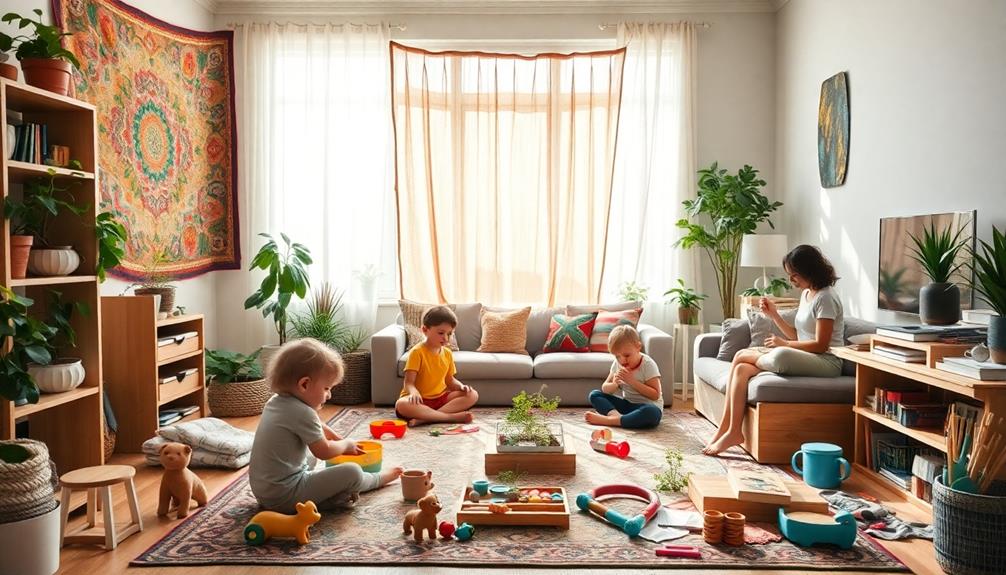
Resilience is an essential trait for children, especially those with a free spirit. To foster resilience, provide your child with opportunities to navigate challenges independently. This practice not only enhances their confidence but also sharpens their problem-solving skills.
Encouraging autonomy by allowing them to make choices, like selecting their clothing or activities, can be particularly beneficial, much like how pet therapy enhances emotional well-being in patients facing challenges. When children feel in control of their decisions, they naturally develop a sense of responsibility.
Celebrate their small successes to reinforce a growth mindset. Each achievement, no matter how minor, motivates them to take risks and face challenges with optimism.
Additionally, teach coping strategies such as deep breathing or mindfulness to equip them with tools for managing emotions and adapting to changes effectively.
Building strong emotional connections through open communication and active listening creates a secure environment. When your child feels understood and supported, they're more likely to express their individuality and thrive.
Building a Supportive Community
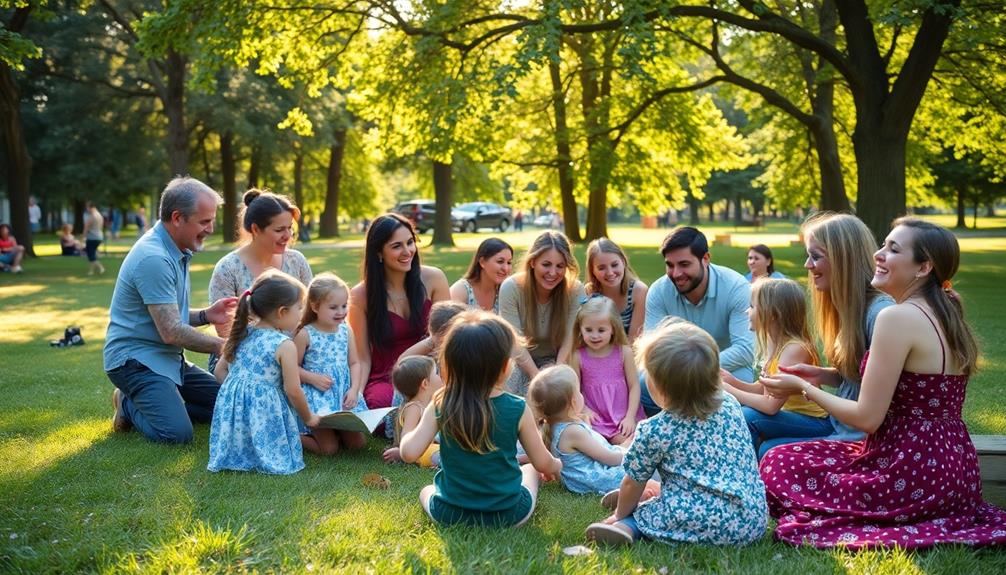
How can you create a supportive community for your free-spirited child? Start by connecting with like-minded families who appreciate individuality and creativity. Seek out local community groups, workshops, and events tailored for spirited children. These environments foster socialization, collaboration, and shared experiences, enhancing your child's sense of belonging.
Additionally, consider engaging in open dialogues about challenges and successes with fellow parents, as this can provide insights similar to those found in successful co-parenting tips.
Don't shy away from engaging in open dialogues with fellow parents. Discussing the unique challenges of raising free-spirited children can lead to valuable insights and strategies. Sharing resources and experiences helps create a supportive atmosphere, reducing feelings of isolation that can feel overwhelming.
Consider establishing an online network through forums or social media. This can help you connect with other parents, offering encouragement and advice at your fingertips.
Lastly, participate in community service projects as a family. This not only allows your child to utilize their gifts in meaningful ways but also instills empathy and cooperation.
Strengthening those community bonds creates a rich environment for your child to thrive. By building this supportive community, you empower your free-spirited child to express themselves fully while surrounded by acceptance and encouragement.
Frequently Asked Questions
How to Raise a Free Spirited Child?
To raise a free-spirited child, encourage their individuality and creativity. Foster open communication, help them understand emotions, and provide gentle guidance. Embrace their unique traits while ensuring they learn social boundaries and responsibilities.
What Is Bohemian Parenting?
Did you know that 70% of children thrive better in creative environments? Bohemian parenting embraces this by fostering individuality and emotional well-being, encouraging you to prioritize experiential learning, open communication, and a connection to nature.
How Would You Describe a Free Spirited Child?
A free-spirited child's creativity shines bright, and their emotions run deep. You'll notice their high energy and sensitivity, often leading to unique expressions of self. Embrace their individuality while guiding them through life's challenges.
How to Handle a Spirited Child?
To handle a spirited child, establish clear boundaries and consistent routines. Use positive reinforcement, listen actively, and offer choices. Engage in one-on-one time to build emotional intelligence, fostering a supportive and understanding environment for them.
Conclusion
So, as you embrace boho parenting, you'll probably find yourself raising the most free-spirited children who just can't sit still. Ironically, while you encourage them to express themselves, you might end up craving a little more structure in your life. But in this beautiful chaos, they'll thrive—discovering their passions and exploring the world with resilience. Remember, it's not about control; it's about letting go. In the end, you might just be the one who learns the most.

